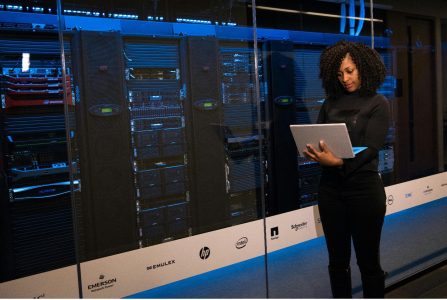Widgetized Section
Go to Admin » Appearance » Widgets » and move Gabfire Widget: Social into that MastheadOverlay zone
The Cost of Computing: Public Perceptions of Data Center Growth
The views expressed are those of the author and do not necessarily reflect the views of ASPA as an organization.
By The VCU Wilder School of Government and Public Affairs
June 13, 2025

Data Centers in Virginia: Balancing Infrastructure and Impact
As the need for cloud computing, internet services and artificial intelligence continues to increase, data centers (physical facilities designed for digital data processing, storage and networking) are providing the infrastructure necessary to store, manage and distribute vast amounts of data. The number of and need for data centers is growing rapidly, with some estimates expecting an increase of 33 percent annually. However, their continued growth also brings concerns and while data centers are an important policy issue across the United States and the world, they are an especially notable concern in the commonwealth of Virginia.
Loudoun County, located in the northern area of Virginia, is sometimes referred to as “data center alley” or the “data center capital of the world” and houses the world’s largest concentration of data centers. More than 25 million square feet of data centers are currently in operation across Loudoun County with even more growth planned.
Many will argue that this growth is necessary as consumers continue to place higher demand on data infrastructure. For example–ChatGPT, which is growing in popularity, requires about 10 times as much energy per search than Google. As artificial intelligence continues to become more engrained in our everyday lives, this number will only continue to grow.
To better understand data center growth and potential impacts on Loudoun County and around the commonwealth, Virginia’s Joint Legislative Audit and Review Commission (JLARC) recently released a report examining the impact of data centers in Virginia. Key findings from this report included:
Data centers benefit Virginia’s economy especially during their initial construction phase
Data centers can provide substantial tax revenue for the localities in which they are located
Data centers greatly increase the demand for energy and this demand is expected to increase
It will be difficult to build sufficient infrastructure to continue meeting the energy demand if data center growth is not managed
This demand for energy will likely increase consumer costs
In addition to energy concerns, data centers also create concerns over noise, pollution and property values
With multiple bills addressing data center expansion and regulation considered during the 2025 General Assembly session, the Winter 2025 Wilder School Commonwealth Poll asked Virginians if they support the idea of allowing more data centers in the state.
This poll, conducted from December 18, 2024 to January 15, 2025, obtained telephone interviews with a representative sample of 806 adults ages 18 or older living in Virginia. Telephone interviews were conducted by landline and cell phone. The sample was weighted to match Virginia’s adult population, which was the primary sampling unit, and the margin of error for the entire sample was ± 4.73.
Findings from the poll showed that opinions were mixed, with 46 percent overall agreeing that Virginia should allow more data centers while 39 percent opposed expansion.
Support was strongest among Republicans (48 percent) and Democrats (47 percent) while Independents were less likely to support growth (36 percent). Those with incomes under $35,000 annually were more likely to support expansion compared to those with higher salaries, as were those aged 35 and older compared to younger individuals.
While many Virginians in more populated areas were opposed to data center growth (e.g. Northern Virginia and Richmond, the state capital), those in rural areas were more open to the idea. The Commonwealth Poll found that most individuals in the northern part of the state (where Loudoun County is located) were opposed to additional data center growth, with 40 percent in that region supporting expansion and 46 percent in opposition. In comparison, more support was found in the Western (52 percent) and South Central (48 percent) parts of the commonwealth. Having both the physical space and a desire for increased tax revenue, data centers may be seen as a benefit to these more rural areas.
Looking ahead, policymakers and practitioners will have to make some difficult decisions regarding data center expansion. While the need for quick large-scale computing is clear and while data centers can meet this need, there are many valid concerns. With each data center comes environmental issues, increased development and increased demand for energy and resources. Do the benefits of data centers outweigh these drawbacks? For many, there is no clear-cut answer and multiple points of view must be considered.
Polls such as this one can provide one important perspective—that of the public. As data center policy decisions are made, understanding these public perspectives can help policymakers to make decisions that are impactful, ethical and in the best interests of those they serve.
Author: The Wilder School’s Center for Public Policy advances research and training that informs public policy and decisionmaking to improve our communities. Drawing on the wide-ranging expertise of Wilder School faculty, we provide services including leadership development and training, economic and policy impact analysis, survey insights and program evaluation to clients in governments, nonprofits, businesses and the public, across Virginia and beyond. Twitter: @VCUWilderSchool


Follow Us!